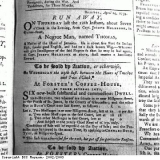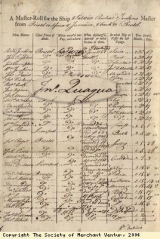The Black Presence in Bristol
Black people have been living in Bristol for at least 400 years. Some may have lived here before then, but it is difficult to tell. Some of those black people that lived in Bristol 400 years ago would have been slaves, but some were free men and women.
The records that can be used for studying the make-up of the population are those such as church registers, wills, court records, newspapers and shipping records. These records do not always state whether someone is black or white. Sometimes this can be guessed at, through a person’s name, for example, or what country they were born in (if this has been recorded). The evidence for Bristol’s black presence has been made even harder to find because many of the city’s records were destroyed during the bombing raids of the Second World War.
The first black person to be recorded as living in Bristol was an un-named gardener employed towards the end of the 1500s at the Great House on what is now the site of Colston Hall in Bristol’s city centre. It is likely there were at least several hundred black people, if not more, in Bristol in the 1700s. Some free black people, such as seamen, servants, actors and soldiers also visited or lived in the city, but there seem to have been few people of colour in the city between 1830 and 1947.
There was a debate about whether black people in Britain could be slaves or not. It was thought that they could only be slaves outside Britain in the colonies (land owned by Britain abroad, such as Jamaica in the Caribbean) and that just setting foot in Britain made them free. However, until the Somerset Declaration of 1772, most black and mixed-race servants in England would have had slave status (that is, they were not free). In 1772, Judge Mansfield had to try the case between James Somerset, a slave who was abandoned in London when he fell ill, and his owner. When Somerset had regained his health, his owner tried to reclaim him and send him back to the Caribbean. The Abolitionists , who campaigned against slavery, took up the case on behalf of James Somerset. With their support the case went to court. The judge decided that owners could not force slaves who lived in England back to the plantations in the Caribbean against their will. This decision was thought by many to mean that slaves in England were free. It did not mean this, but it did mark the beginning of the end of slavery in Britain itself. A slave’s position in the eyes of the law in Britain was still unclear. Even after 1772, there are cases of slaves being returned by force to the Caribbean plantations by their owners, against the legal ruling of the Somerset Declaration.




